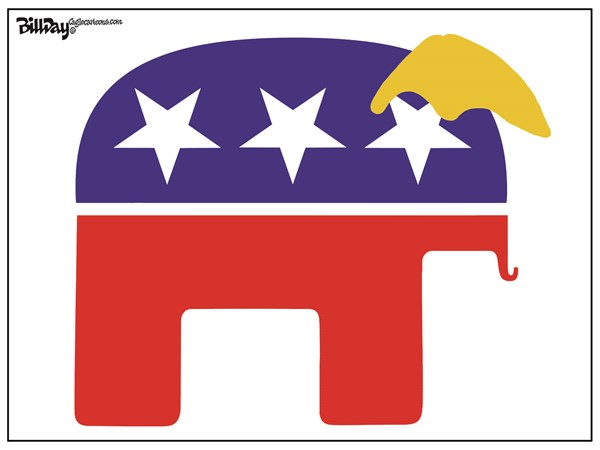
If you’re expecting Donald Trump to change now that he's the presumptive Republican presidential nominee, forget it. Trump says he can act presidential any time he wants to. But that time rarely comes. There's a reason for this. Trump equates being presidential with being boring. And boring isn't his style.
Trump will give a few speeches on major issues with presidential-level trappings—teleprompters, prepared texts, invited audiences. He's preparing one on the Supreme Court, a successor to Justice Antonin Scalia, and judges. Others are likely to focus on infrastructure and the scandals at the Veterans Administration.
But that's about it in the boring department. No effort is being drawn up to create a New Trump akin to the New Nixon a half-century ago. When Trump learned Paul Manafort, his convention chief and top adviser, had talked to Republican officials about a change in his style, he nixed the idea instantly.
"We are running a nontraditional campaign," says Corey Lewandowski, Trump's campaign manager. Indeed, they are.
Trump is viewed unfavorably by seven out of ten women in opinion polls, but there's no special event to appeal to women planned by his campaign. Nor is there a Hispanic event on Trump's schedule, though his unfavorable rating among Hispanics, potentially a pivotal voting bloc, is sky-high.
Trump's speeches aren't "designed to speak to one demographic," Lewandowski told me. He delivers the same message to everyone.
As for party unity, regarded as essential to winning the presidential race, Trump insists he can win without it. Based on his minimal effort (so far) to unify the Republican party, he seems to believe this. Democrats take the traditional approach and expect their party to be unified behind Hillary Clinton.
Asked about unity, Lewandowski says "a lot of that is already happening"—that is, happening without a big push from Trump. Lewandowski mentioned the recent endorsements of Trump by Senate majority leader Mitch McConnell and Republican senator Kelly Ayotte of New Hampshire.
And he suggested Trump's fundraising has a unifying effect. "We are raising money for down-ballot races," he says, as well as for GOP outfits.
The formal speeches, however, are quite traditional. They represent the "positive Trump," says Newt Gingrich, an unofficial adviser to the candidate. But it's the "negative Trump" that will get more attention. He is very good at "shrinking his opponents," Gingrich says.
Hillary Clinton, Trump's likely Democratic opponent, thinks she knows what to expect from him. Her strategists claim they know how to combat his attacks and boast about this in the media.
Perhaps they've figured Trump out.
But Lewandowski doesn't think so. And now Trump has more free time to devise clever tactics against Clinton. He is very skillful at this. With Ted Cruz and John Kasich having dropped out, Trump no longer has to bother with them between now and the California primary on June 7. He can focus on Clinton and her vulnerabilities.
One adviser says Trump's strategy will run a "scorched earth" campaign like those waged successfully by Republican senator Jesse Helms in North Carolina. Helms put far more pressure on his Democratic foes than they had imagined possible.
Helms, who served five terms and died in 2008, was a gentleman in his races. Trump won't be. His aim will be to make Clinton's already low ratings on honesty and trustworthiness even lower. Can he pull this off? I wouldn't rule it out. "He likes to compete," Gingrich says. Trump will also have to tend to his own favorability, which is lower than hers.
What Senator Bernie Sanders, Clinton's rival for the Democratic nomination, has shied away from Trump intends to exploit.
Sanders attacked her highly paid speeches to Wall Street firms and how they affected her willingness to crack down on misdeeds by the financial industry.
Clinton is a broad, soft, and rich target. There is so much to attack that it may be difficult for Trump to decide what to single out.
There's the Clinton Foundation, its donors, and what was done for them even as Clinton was secretary of state. That's an under-publicized scandal. There are her private emails that exposed top-secret national security information, now under criminal investigation by the FBI. Her husband Bill Clinton's philandering and her role in preventing his paramours from speaking out publicly is sure to be worked over by Trump.
Trump has gotten lots of advice on running in the general election, including a memo from Newt Gingrich's daughter Jackie Gingrich Cushman, a columnist for Creators Syndicate. Several themes from her memo appeared in her column last week.
She noted the CNN/ORC poll that has Clinton beating Trump, 54 percent to 41 percent. That poll and others like it are wrong, she wrote. "Clinton is very beatable, especially by Trump."
When Clinton plays the "woman card," voters will be reminded that she is "a career politician .??.??. no different from the rest of the Establishment. .??.??. She is a professional politician and therefore cannot get anything done."
Cushman noted that Trump has no interest in leading the Republican party. That's a positive trait. "Trump is interested in leading the nation—for all Americans. He happens to be a Republican, but his goal is to win the presidency—not to manage the party." When Trump says "America First," it means he's putting the country "above party, above other nations, and that's why voters love him."
Newt Gingrich says being presidential and boring don't always go together. "Ronald Reagan managed to be presidential without being boring," he says. Trump might give that some consideration.
Comment by clicking here.
Fred Barnes is Executive Editor at the Weekly Standard.



 Contact The Editor
Contact The Editor
 Articles By This Author
Articles By This Author